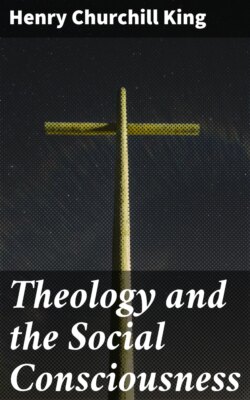Читать книгу Theology and the Social Consciousness - Henry Churchill King - Страница 5
На сайте Литреса книга снята с продажи.
INTRODUCTION
THE POINT OF VIEW OF THE THEOLOGIAN
ОглавлениеTable of Contents
First, then, what is the real meaning of the social consciousness, as the theologian must view it? The answer to this question involves a preliminary one: What is the point of view of the theologian in any investigation? One can only give his own answer.
First of all, the theologian, as such, is an interpreter, not a tracer of causal connections. He builds everywhere upon the scientific investigator, and takes from him the statement of facts and processes. With these he has primarily nothing to do. With reference to the social consciousness, therefore, he does not attempt to do over again the work of the sociologist; he asks only, What does the social consciousness, in the light of the whole of life and thought, mean; not, How did it come about?
The theologian, too, is a believer in the supremacy of spiritual interests; this is his central contention. He affirms strenuously, with the scientific worker, the place and value of the mechanical; but he is certain that the mechanical can understand itself even, only as it is seen to be simple means, and thus clearly subordinate in significance. His problem is, therefore, everywhere, that of ideal interpretation, not of mechanical explanation. But, while he has nothing to do with the scientific tracing of immediate causal connections, he recognizes causality itself as requiring an ultimate explanation, that cannot be mechanically given. The theologian must be in this, then, an ideal interpreter, and an inquirer after the ultimate cause.
The theologian assumes, moreover, the legitimacy and value of the fact of religion; for theology is simply the thoughtful, comprehensive, and unified expression of what religion means to us. The meaning of the social consciousness to the theologian involves, therefore, at once the question of its relation to religious conviction.
The point of view of the Christian theologian involves, besides, the reality of the personal God in personal relation to persons. Theology is in earnest in its thought of God, and knows that God is everywhere to be taken into account; that, if there is a God at all, he is not to be exiled into some corner of his universe, but is intimately concerned in all, is at the very heart of all; and that, therefore, it is not a matter of merely curious interest or of subsidiary inquiry, whether we are to look at our questions with God in mind.
Finally, the Christian theologian tries everywhere to make his point of view the point of view of Christ. The theology, upon which he ultimately stakes his all, is Christ's theology. He knows that there is much concerning which he cannot refuse to think, but upon which Christ has not expressed himself either explicitly or by clear inference; but in all this unavoidable supplementary thinking he aims to be absolutely loyal to the spirit of Christ.
From this point of view of the Christian theologian, now, what does the social consciousness mean? The answer may be given under four heads: (1) the definition of the social consciousness; (2) the inadequacy of the analogy of the organism, as an expression of the social consciousness; (3) the necessity of the facts, of which the social consciousness is the reflection, if ideal interests are to be supreme; (4) the ultimate explanation and ground of the social consciousness.
These four topics form the subjects of the four chapters of the first division of our inquiry.
